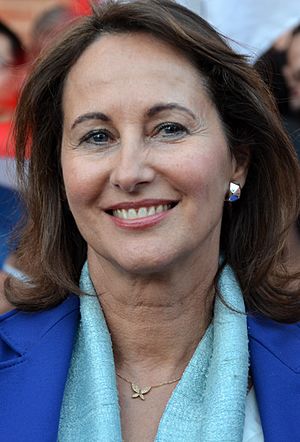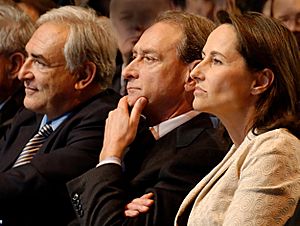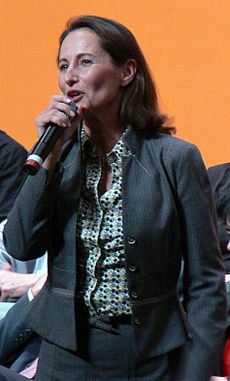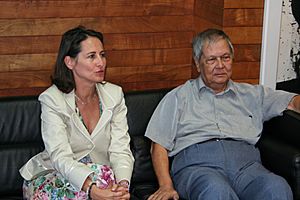Ségolène Royal facts for kids
Quick facts for kids
Ségolène Royal
|
|
|---|---|

Royal in 2012
|
|
| Minister of Ecology, Sustainable Development and Energy | |
| In office 2 April 2014 – 10 May 2017 |
|
| Prime Minister | Manuel Valls Bernard Cazeneuve |
| Preceded by | Philippe Martin |
| Succeeded by | Nicolas Hulot (Minister of Ecological and Solidary Transition) |
| President of the Regional Council of Poitou-Charentes | |
| In office 30 March 2004 – 21 April 2014 |
|
| Preceded by | Élisabeth Morin |
| Succeeded by | Jean-François Macaire |
| Minister delegate for Families, Children and People with Disabilities | |
| In office 20 March 2000 – 6 May 2002 |
|
| Prime Minister | Lionel Jospin |
| Preceded by | Martine Aubry |
| Succeeded by | Jean-François Mattei |
| Minister delegate for School Teaching | |
| In office 4 June 1997 – 27 March 2000 |
|
| Prime Minister | Lionel Jospin |
| Preceded by | Françoise Hostalier (Secretary of State for School Teaching) |
| Succeeded by | Xavier Darcos (Minister of Labour, Social Relations, Families, Solidarity and the Cities) |
| Minister of the Environment | |
| In office 2 April 1992 – 29 March 1993 |
|
| Prime Minister | Pierre Bérégovoy |
| Preceded by | Brice Lalonde |
| Succeeded by | Michel Barnier |
| Member of the National Assembly for Deux-Sèvres's 2nd constituency |
|
| In office 19 June 2002 – 19 June 2007 |
|
| Preceded by | Jean-Pierre Marché |
| Succeeded by | Delphine Batho |
| In office 2 April 1993 – 4 July 1997 |
|
| Preceded by | Jean-Pierre Marché |
| Succeeded by | Jean-Pierre Marché |
| In office 23 June 1988 – 2 May 1992 |
|
| Preceded by | Constituency re-established |
| Succeeded by | Jean-Pierre Marché |
| Departmental Councillor of Deux-Sèvres | |
| In office 2 April 1992 – 27 March 1998 |
|
| Constituency | Canton of La Mothe-Saint-Héray |
| Ambassador of France for the Arctic and Antarctica | |
| In office 1 September 2017 – 24 January 2020 |
|
| President | Emmanuel Macron |
| Preceded by | Michel Rocard |
| Succeeded by | Olivier Poivre d'Arvor |
| Personal details | |
| Born |
Marie-Ségolène Royal
22 September 1953 Dakar, French West Africa (present-day Senegal) |
| Political party | Independent (2017–2021; 2023–present) |
| Other political affiliations |
PS (1978–2017; 2021–2023) |
| Domestic partner | François Hollande (1978–2007) |
| Children | 4 |
| Relatives | Gérard Royal (brother) |
| Alma mater | Nancy 2 University Sciences Po ÉNA |
| Signature | |
Ségolène Royal (born 22 September 1953) is a famous French politician. She made history in the 2007 French presidential election by becoming the first woman in France to make it to the final round of a presidential election.
Royal was a member of the Socialist Party for many years. She was the first woman chosen by a major party to run for president. Although she lost the 2007 election to Nicolas Sarkozy, her campaign was a major milestone for women in French politics.
She has held many important jobs, including Minister for the Environment and Minister for Ecology. From 2004 to 2014, she was the president of the Poitou-Charentes region in France.
For many years, her partner was François Hollande, who later became the President of France. They have four children together.
Contents
Early Life and Education
Marie-Ségolène Royal was born in Dakar, Senegal, which was then part of French West Africa. Her father, Jacques Royal, was an army officer. She was one of eight children.
After high school, she earned a degree in economics. She then went to a famous university in Paris called Sciences Po. This is where she became interested in politics and women's rights.
Like many top French politicians, Royal graduated from the École nationale d'administration (ÉNA). This is a special school that trains people for high-level jobs in the French government. At ÉNA, she was in the same class as her future partner, François Hollande.
Political Career
After graduating in 1980, Royal began working for the government. She was noticed by President François Mitterrand's team and joined his staff in 1982.
Member of the National Assembly
In 1988, Royal decided to run for a seat in the National Assembly, which is part of the French parliament. She ran in a rural area called Deux-Sèvres where it was difficult for her party to win.
Many people thought she would lose, but she won the election. She served as a representative in the National Assembly for several terms.
Working as a Minister
Royal has held several minister positions in the French government. A minister is in charge of a specific department, like education or the environment.
- Minister of Environment: 1992–1993
- Minister of School Education: 1997–2000
- Minister of Family and Children: 2000–2002
President of a French Region
In 2004, Royal was elected president of the Poitou-Charentes Regional Council. A regional president is like a governor and is in charge of a large area of the country. She held this job until 2014.
The 2007 Presidential Election

In 2006, Royal announced she wanted to run for President of France. She had to compete against other members of her own Socialist Party in a special election called a primary. She won the primary with over 60% of the vote, becoming the first woman in France to be nominated for president by a major party.
Her campaign focused on social issues and helping families. In the first round of the presidential election, she got enough votes to move on to the final round. She faced Nicolas Sarkozy.
In the final vote on May 6, 2007, Sarkozy won the election. Even though she lost, Royal's campaign was seen as a historic achievement.
Return to Government
In 2014, Royal was appointed Minister of Ecology, Sustainable Development and Energy. In this role, she worked on important environmental issues for France.
One of her projects was a plan to build 1,000 kilometers of "solar roadways," which are roads paved with solar panels to generate electricity. A one-kilometer section was built to test the idea.
From 2017 to 2020, she served as France's Ambassador for the Arctic and Antarctic poles, focusing on protecting these sensitive regions.
What Ségolène Royal Believes In

Royal is known for focusing on issues that affect families, children, and the environment. She has often spoken about the need to protect children from seeing too much violence on television.
Environment
As Minister for the Environment, Royal worked on new laws for recycling waste and protecting the French countryside. She also created a law to reduce noise pollution, especially around airports.
Education
Royal has worked to improve schools. She supported programs for extra tutoring, teaching languages in primary schools, and getting parents more involved in their children's education. She also worked on programs to stop bullying in schools.
Family and Social Issues
Royal has worked on laws to support parents and families. She helped create paternity leave, which allows fathers to take time off work after a baby is born. She also supported building more nursery schools and helping families with disabled children.
Personal Life
From the late 1970s until 2007, Ségolène Royal's partner was François Hollande. They met at the ENA university and have four children together: Thomas, Clémence, Julien, and Flora. The couple separated in 2007. In 2012, Hollande was elected President of France.
Her brother, Gérard Royal, was involved with the French secret service. Her cousin, Anne-Christine Royal, is also involved in politics but for a different political party.
Images for kids
See also
 In Spanish: Ségolène Royal para niños
In Spanish: Ségolène Royal para niños
 | Janet Taylor Pickett |
 | Synthia Saint James |
 | Howardena Pindell |
 | Faith Ringgold |




